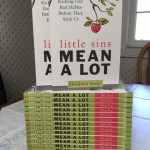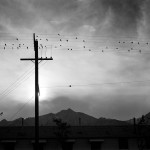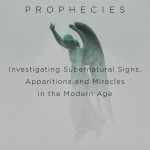Our early-morning chat with Fr. James Martin is here. Now that we’ve all munched a bit, let us continue – there are questions here about 9/11, relativism and more. Don’t forget, you can get a 35% discount on My Life With the Saints if you order via Loyola Press between today and June 8! Mention marketing code 2683 when ordering it either online at Loyola Books or calling 800-621-1008. Keep scrolling down for new questions and answers.
Question/Comments from Jason, Martha and Snupnhomer: in the comments section here, all discussing the “overvaluing” of saints.
From Fr. Jim: Dear Jason and Martha and Snupnhomer –
When I speak about “overvaluing” the saints, I am referring to a certain tendency in some Catholic circles in which the saints sometimes even usurp the position of Jesus. For example, I once met a woman after one of my saints talks (in a parish and city that will remain nameless) who told me she didn’t need to go to Mass because she could pray to St. Therese of Lisieux! Devotion to the saints, which is a central part of my own Catholic life, can sometimes, if not grounded in solid Catholic theology, lead to superstitious practices. Sometimes people pray to the saints not to intercede for them, but to actually do the miracles, or favor, themselves. It is always important to remember that God is in charge of all of this. Also, you are right in saying that we must fully embrace sanctity and their sinfulness as a part of their lives, in order to understand them more fully. This is actually one of the underlying themes in my book.
Question from Bender (following long comment on positive and negative images of Catholic doctrine here):
It is clear that Pope Benedict “gets it,” as he has attempted to take various teachings that were previously presented in somewhat negative terms and restate them in positive terms. And, of course, John Paul II’s Theology of the Body was an enormous attempt to restate what had previously been negatively-oriented teachings on human sexuality (don’t do this, don’t do that), and to present them in their proper positive light….Do you perceive a similar change in perspective, to a more “positive” view, in the various bishops, priests, theologians, catechists, etc., that you come across? Will we see some tangible success in correcting the misconception that the Church (at least in her moral teachings) is little more than a bunch of negative prohibitions and restrictions on behavior?
From Fr. Jim: One definite sign that the church is more fully understanding its message needing to be presented “more positively,” is the almost ecstatic reception that Pope Benedict XVI received during his visit to the States. It would be hard for anyone in the church to ignore the fact that so much of what he said was an invitation, not an admonition. And I do hope that those who are responsible for teaching the faith will take a page from the pope’s book. As much as Jesus asked people not to sin, most of his message was an invitation towards love. So, I pray along with you that we are more able to set forth our message as a positive one.
Question from Dianne (via email): Your chapter on St. Bernadette was very moving, especially when you wrote about the man who heard the locution that his sins were forgiven. Jesuits are trained to be skeptical and reasonable but Lourdes seems totally unreasonable, but you write like you love it. Please explain.
From Fr. Jim: What a wonderful question! I do love Lourdes, and Jesuits are trained to rely on their reason, but also even more on their faith. Of course, the best definition of theology is from St. Anselm, who defined it as fides quaerens intellectum, or “faith seeking understanding.” And, as St. Thomas Aquinas shows us there should be no conflict between faith and reason.
Lourdes, however, is one of those places that shows me that it is very important to have a place for the supernatural in one’s religious life, even as we rely on our reason as an important gift from God. There are simply things that transcend our reason–like the Marian apparition and the miracles at Lourdes–and that also need to be understood as divine interventions in our world. In fact, our Catholic faith is based on an event that transcends our reason, our human experience, and our limited worldview: that is, the Resurrection. In short, the transcendent, the unreasonable and the mysterious needs to be a reasonable part of our faith.
Question from Kathyg: Fr. Jim — do you think there are too many saints? I wonder if it is difficult for some to look to the saints as role models/guides since there are so many of them. When you look at their biographies, there is a lot more info on some than others.
From Fr. Jim: I don’t think that there can ever be too many saints. For one thing, the more saints there are, the easier it is for us to find a role model among them–or a patron, or simply a companion along the way. There are of course many biographies of the saints, and it can be quite overwhelming at times to sort your way through them, but a good way to start is to start closer to home. So first, see what you can find out about your patron saint, like St. Katherine Drexel, St. Catherine of Alexandria, and St, Catherine of Siena. Second, what do you know about the patron saint of your church and diocese? And, finally, how much to know about all the wonderful America saints, like St. Elizabeth Ann Seton, St. John Neumann, St. Mother Theodore Guerin, and St. Frances Xavier Cabrini? Those might be good places to start when it comes to the many thousand lives of saints. And beside, aren’t you happy that all those thousand of saints are praying for you?
Comment from Sandra: I just finished reading chapter 7 of “My Life With the Saints.” I couldn’t stop reading. I am going to purchase the book. I am an Episcopalian and about a year an a half ago, I began learning to recite the Anglican Breviary. During many recitations my voice breaks and my heart and mind, too, break open. I pray the prayers that honor the Blessed Virgin. I don’t know where I am with saints but I know that today I am moved to write to you and thank you for Fr. James Day…I am an older woman and with the man at Lourdes I would like to have the grace to feel my sins are forgiven.
From Fr. Jim: Just a brief note to say thank you so much for your comments. One of the chapters in my book, on the Uganda martyrs talks specifically about the Episcopal martyrs.
Question from The Anchoress (after quoting a bit from this article on Tony Blair and his Faith Foundation, in which the writer notes Blair’s seriousness about 9/11: You mentioned 9/11 in another answer. How soon were you on the scene there, can you share a little of what you were thinking, feeling and fearing at that time?
From Fr. Jim: Actually, I wrote a whole book about that very good and very deep question: “Searching for God at Ground Zero.” I arrived at Ground Zero on September 13, when it was still a smoking ruin. At the time, it was simply overwhelming in terms of what I was seeing (the colossal destruction), what I was feeling (a huge sadness that came from the knowledge that I was standing before a grave) and fearing (that I might see, or have to see, some of the dead). But, as I mentioned in the book, the most profound experience at Ground Zero was one of the Holy Spirit. In my days there, I felt an enormous sense of unity, concord and peace, which came from the experience of being among so many good people working together, for the good after the tragedy. So, oddly enough, my own experience of Ground Zero is one of the Holy Spirit. I know for many it is a Good Friday, but for me, since I arrived after the attacks, it was one of an Easter Sunday, strange as that is to hear.
Question from The Anchoress: Pope Benedict XVI talked about the Dictatorship of Relativism. Do you see relativistic and utilitarian mindsets as being incompatible with the lives of the saints?
From Fr. Jim: Yes, the saints, as Kierkegaard said, “will the one thing.” In other words, they are focused on Christ, and understand their priorities, which is the opposite of relativism. As well, they reject the utilitarian mindset that say that people, indeed all of creation, are simply objects, are a means to an end. They saw all of creation at every moment as signs of God’s presence. In fact, I think the saint is the one who sees God at every moment of his or her day. This of course is the opposite of utilitarianism.
[Whispered aside from The Anchoress: That excellent answer reminds me of one of my favorite little quotes: “When you have become God’s in the measure He wants, He, Himself will know how to best bestow you on others. Unless He prefer, for thy greater advantage, to keep thee all to Himself.” St. Basil]
From Sandra: If you hear a voice in your mind or vocally, how can I know if it is authentic and from God?
From Fr. Jim: First of all, it is important to remember that actually, physically, hearing a voice coming from God is quite rare, even in the lives of saints. More common is the experience of having words come into your mind during prayer and feeling them as coming from God. All these things need to be discerned carefully. My first question would be, Does what is being said seem as if it is coming from God? Does it make sense based on our understanding and knowledge of God? For example, if that voice is telling you to dong something sinful, that voice is not from God. But the best test is what St. Paul talks about, which is: Does this lead you to a greater increase in charity and love in your life? By these “fruits,” as Paul says, you will know if this is God speaking to you in your prayer.
But once again, these things need to be carefully discerned, and compared against the Gospel, Church tradition, and common sense. Also trust that God will speak to you, not only in these rare ways, but also in more common ways, such as: through your relationships, your emotions, and your faith tradition.
From Buster: My mom calls you as a “joyful” priest. How tough was it to tell your family you felt you had a vocation, and do you get a lot of grief from strangers or non-Catholics over the scandals?
From Fr. Jim: Yes, I am a joyful priest! Twenty years ago this month, my family and friends thought I was crazy when I told them I was entering the Jesuits. But that’s not surprising – I had told them very little about my discernment process, and they knew, just like I did, very little about the Jesuits. But once they saw I was happy they came to support my decision, and my friends and family celebrated with me at my first vows and my ordination.
Secondly, I did get a lot of questions during the sexual abuse scandal, which was the most painful time of my still-short lived priesthood. (I wrote a great deal about it as well in various places.) But those questions were to be expected. Everyone was appalled by the scandal, so it was my responsibility, as it was, and is, for other priests and religious, to listen to what people had to say, offer my perspective and pray with them.
From Chris: How do you believe in the Real Presence in the Holy Eucharist. I don’t mean do you believe it’s the real Body and Blood, but how? I accept it and I “believe” it, okay, but how do you really believe?
From Fr. Jim: Well, that is a big question! It may take you some time to really believe, if you’re at the beginning of your faith journey. But besides looking at the Gospels, at the places where Jesus “institutes” the Eucharist (i.e., the Last Supper), the most helpful thing for me is to remember that the Holy Spirit, which Jesus promised us, helps to guide the Church in its tradition. So one way that helps me believe in these mysteries is to rely on my belief in the Holy Spirit, present in the traditions of the Church.
[Anchoress whispering aside, again – sometimes I think there is also a bit of choice involved in belief. I know there was a moment in my adulthood where I stood before the tabernacle and really asked myself what I believed about it, (or maybe I was being asked) but I took the time to consider all I had been taught, all I could reason, all the scripture and then, finally, all I knew of my person encounters with the Holy Eucharist and the consolations I’d found there all my life, and I realized that not only did I believe, but I was at that moment CHOOSING to believe it in a much deeper and more committed way. I think that is just the way it is with love and with growing in any relationship…there is a point where you choose to go on, choose to believe, choose to go forward, and then, once you accept that the belief (or the relationship) is true…the rest follows. But that’s just me.]
Let’s take a coffee break (I will go make a delicious pot of Mystic Monk Coffee) and come back with a new thread!















